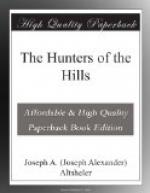“I’m thinking stronger than ever that this is good deer country,” he said. “It has all the looks of it, since they can find here the food they like, and it hasn’t been ranged over for a long time by white man or red. Tayoga, you and Robert oughtn’t to be long in finding the game we want.”
“I think like the Great Bear that we’ll not have to look far for deer,” said the Onondaga, “and I leave my rifle with you while I take my bow and arrows.”
“I’ll keep your rifle for you, Tayoga, and if I didn’t have anything else to do I’d go along with you two lads and see you use the bow. I know that you’re a regular king with it.”
Tayoga said nothing, although he was secretly pleased with the compliment, and took from the canoe a long slender package, wrapped carefully in white, tanned deerskin, which he unrolled, disclosing the bow, waano.
The young Onondaga’s bow, like everything he wore or used, was of the finest make, four feet in length, and of such powerful wood that only one of great strength and equal skill could bend it. He brought it to the proper curve with a sudden, swift effort, and strung it. There he tested the string with a quick sweeping motion of his hand, making it give back a sound like that of a violin, and seemed satisfied.
He also took from the canoe the quiver, gadasha, which was made of carefully dressed deerskin, elaborately decorated with the stained quills of the porcupine. It was two feet in length and contained twenty-five arrows, gano.
The arrows were three feet long, pointed with deer’s horn, each carrying two feathers twisted about the shaft. They, like the bow and quiver, were fine specimens of workmanship and would have compared favorably with those used by the great English archers of the Middle Ages.
Tayoga examined the sharp tips of the arrows, and, poising the quiver over his left shoulder, fastened it on his back, securing the lower end at his waist with the sinews of the deer, and the upper with the same kind of cord, which he carried around the neck and then under his left arm. The ends of the arrows were thus convenient to his right hand, and with one sweeping circular motion he could draw them from the quiver and fit them to the bowstring.
The Iroquois had long since learned the use of the rifle and musket, but on occasion they still relied upon the bow, with which they had won their kingdom, the finest expanse of mountain and forest, lake and river, ever ruled over by man. Tayoga, as he strung his bow and hung his quiver, felt a great emotion, the spirit of his ancestors he would have called it, descending upon him. Waano and he fitted together and for the time he cherished it more than his rifle, the weapon that the white man had brought from another world. The feel of the wood in his hand made him see visions of a vast green wilderness in which the Indian alone roamed and knew no equal.




